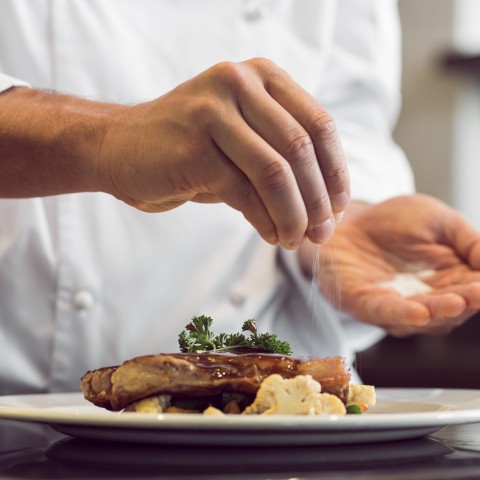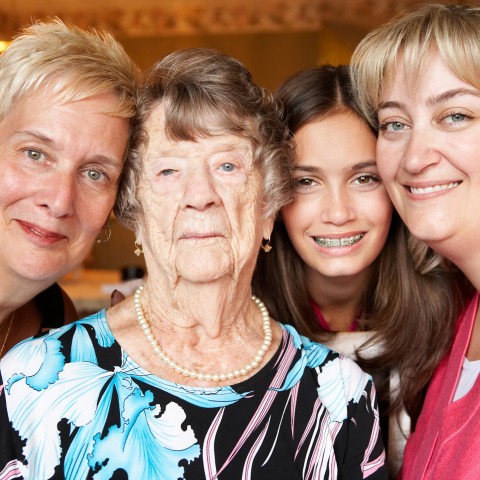
In this article, you’ll learn all the essential Greek nouns so that you can enhance your knowledge about useful, everyday words.
Before we start our modern Greek nouns list, what are Greek declensions?
In Greek,
each noun has a gender, which is indicated by its article. More specifically, Greek noun declension by gender uses the following articles:
- ο (singular) or οι (plural) — indicates a masculine noun
- η (singular) or οι (plural) — indicates a feminine noun
- το (singular) or τα (plural) — indicates a neutral noun
Therefore, in this guide, we’ll use the articles respectively to indicate the Greek nouns’ gender and number.
Are you ready to learn some nouns in Greek?
Let’s begin!
 Table of Contents
Table of Contents
- Appliances
- Technology
- Transportation
- Restaurant
- School Essentials
- Occupation
- Family Members
- Body Parts
- Time
- Conclusion
1. Appliances

1. Η τηλεόραση (i tileórasi) – “TV”
Greek: Το διαμέρισμα έχει δορυφορική τηλεόραση.
Romanization: To diamérizma éhi doriforikí tileórasi.
Translation: The apartment has satellite TV.
2. Το κλιματιστικό (to klimatistikó) – “air conditioner”
Greek: Άναψε το κλιματιστικό, γιατί έχει πολλή ζέστη εδώ μέσα.
Romanization: Ánapse to klimatistikó, yatí éhi polí zésti edó mésa.
Translation: Turn on the air conditioner because it’s very hot in here.
3. Το πλυντήριο (to plindírio) – “washing machine” [for clothes]
Greek: Το πλυντήριο είναι καινούργιο.
Romanization: To plindírio íne kenúrio.
Translation: The washing machine is new.
4. Το στεγνωτήριο (to stegnotírio) – “dryer” [for clothes]
Greek: To στεγνωτήριο στεγνώνει τα ρούχα πολύ γρήγορα.
Romanization: To stegnotírio stegnóni ta rúha polí grígora.
Translation: The dryer dries the clothes very quickly.
5. Το πλυντήριο πιάτων (to plindírio piáton) – “dishwasher”
Greek: Ξέπλυνε τα πιάτα, πριν τα βάλεις στο πλυντήριο πιάτων.
Romanization: Xépline ta piáta, prin ta vális sto plindírio piáton.
Translation: Rinse the dishes before you put them into the dishwasher.
6. Ο φούρνος (o fúrnos) – “oven/stove”
Greek: Αυτό το φαγητό χρειάζεται ψήσιμο μόνο 30 λεπτά στον φούρνο.
Romanization: Aftó to fayitó hriázete psísimo móno triánda leptá ston fúrno.
Translation: This food needs baking for only thirty minutes in the oven.
7. Ο φούρνος μικροκυμάτων (o fúrnos mikrokimáton) – “microwave”
Greek: Ο φούρνος μικροκυμάτων ζεσταίνει το φαγητό πολύ γρήγορα.
Romanization: O fúrnos mikrokimáton zesténi to fayitó polí grígora.
Translation: The microwave heats up the food really quickly.

8. Οι εστίες (i estíes) – “hot plates/burners”
Greek: Οι εστίες φαίνονται πολύ βρόμικες.
Romanization: I estíes fénode polí vrómikes.
Translation: The hot plates look very dirty.
9. Το πιστολάκι (to pistoláki) – “hair dryer”
Greek: Το καλοκαίρι αποφεύγω το πιστολάκι, επειδή ξεραίνεται το μαλλί μου.
Romanization: To kalokéri apofévgo to pistoláki, epidí xerénete to malí mu.
Translation: In the summer, I avoid using the hair dryer because it dries out my hair.
10. Ο ανεπιστήρας (o anemistíras) – “fan”
Greek: Ο ανεμιστήρας οροφής δροσίζει το δωμάτιο.
Romanization: O anemistíras orofís drosízi to domátio.
Translation: The ceiling fan cools down the room.
11. Το ψυγείο (to psiyío) – “fridge”
Greek: Βάλε τις μπύρες στο ψυγείο, για να τις πιούμε παγωμένες.
Romanization: Vále tis bíres sto psiyío, ya na tis piúme pagoménes.
Translation: Put the beers in the fridge, so that we can drink them cold.
2. Technology

12. O ηλεκτρονικός υπολογιστής (o ilektronikós ipoloyistís) – “computer”
Greek: Ο ηλεκτρονικός υπολογιστής μου ήταν παλιός, οπότε αγόρασα έναν καινούργιο.
Romanization: O ilektronikós ipoloyistís mu ítan paliós, opóte agórasa énan kenúrio.
Translation: My computer was old, so I bought a new one.
13. Ο φορητός υπολογιστής (o foritós ipoloyistís) – “laptop”
Greek: Πήρα τον φορητό υπολογιστή μου και πήγα σε μια καφετέρια.
Romanization: Píra ton foritó ipoloyistí mu ke píga se mia kafetéria.
Translation: I took my laptop and went to a cafeteria.
14. Το τάμπλετ (to táblet) – “tablet”
Greek: Το τάμπλετ που αγόρασα είναι πολύ ελαφρύ.
Romanization: To táblet pu agórasa íne polí elafrí.
Translation: The tablet I bought is very lightweight.
15. To κινητό τηλέφωνο / κινητό (to kinitó tiléfono / kinitó) – “cell phone”
16. Το έξυπνο τηλέφωνο (to éxipno tiléfono) – “smartphone”
Greek: Οι περισσότεροι άνθρωποι προτιμούν ένα έξυπνο τηλέφωνο από ένα απλό κινητό.
Romanization: Oi perisóteri ánthropi protimún éna éxipno tiléfono apó éna apló kinitó.
Translation: Most people prefer a smartphone over a simple cell phone.
17. Τα ακουστικά (ta akustiká) – “headphones”
18. Ο φορτιστής (o fortistís) – “charger”
Greek: Μην ξεχάσεις να πάρεις μαζί σου τα ακουστικά και τον φορτιστή σου.
Romanization: Min xehásis na páris mazí su ta akustiká ke ton fortistí su.
Translation: Don’t forget to take your headphones and your charger with you.
19. Η ιστοσελίδα (i istoselída) – “website”
20. Ο λογαριασμός (o logariazmós) – “account”
21. Ο κωδικός πρόσβασης (o kodikós prózvasis) – “password”
Greek: Η πρόσβαση στην ιστοσελίδα γίνεται με έναν λογαριασμό και έναν κωδικό πρόσβασης.
Romanization: I prózvasi stin istoselída yínete me énan logariazmó ke énan kodikó prózvasis.
Translation: Access to the website is granted by using an account and a password.
22. Το αρχείο (to arhío) -“file”
Greek: Το αρχείο ήταν τόσο μεγάλο που δεν μπορούσα να το στείλω μέσω email.
Romanization: To arhío ítan tóso megálo pu den borúsa na to stílo méso ’email.’
Translation: The file was so big that I couldn’t send it via email.
23. Το ποντίκι (to pondíki) – “mouse”
24. Το πληκτρολόγιο (to pliktrolóyio) – “keyboard”
Greek: Αγόρασα ένα ασύρματο ποντίκι και ένα πληκτρολόγιο.
Romanization: Agórasa éna asírmato pondíki ke éna pliktrolóyio.
Translation: I bought a wireless mouse and a keyboard.
25. O εκτυπωτής (o ektipotís) – “printer”
Greek: Αυτός ο εκτυπωτής εκτυπώνει ασπρόμαυρα.
Romanization: Aftós o ektipotís ektipóni asprómavra.
Translation: This printer prints in black and white.
3. Transportation

26. Το αεροπλάνο (to aeropláno) – “airplane”
27. Το αεροδρόμιο (to aerodrómio) – “airport”
Greek: Το αεροπλάνο απογειώθηκε από
το αεροδρόμιο της Αθήνας μετά από τρεις ώρες καθυστέρηση.
Romanization: To aeropláno apoyióthike apó to aerodrómio tis Athínas metá apó tris óres kathistérisi.
Translation: The airplane took off from the Athens airport after a three-hour delay.
28. Το τρένο (to tréno) – “train”
29. O σταθμός του τρένου (o stathmós tu trénu) – “train station”
Greek: Ο σταθμός του τρένου είχε πολύ κόσμο.
Romanization: O stathmós tu trénu íhe polí kózmo.
Translation: The train station was very crowded.
30. To λεωφορείο (to leoforío) – “bus”
31. Η στάση του λεωφορείου (i stási tu leoforíu) – “bus stop”
Greek: Η στάση του λεωφορείου είναι πολύ κοντά στο ξενοδοχείο.
Romanization: I stási tu leoforíu íne polí kondá sto xenodohío.
Translation: The bus stop is very close to the hotel.
32. Το ταξί (to taxí) – “taxi”
33. Το αυτοκίνητο (to aftokínito) – “car”
Greek: Θα πάρω ένα ταξί, γιατί το αυτοκίνητό μου είναι χαλασμένο.
Romanization: Tha páro éna taxí, yatí to aftokínitó mu íne halazméno.
Translation: I’ll take a taxi because my car has broken down.
34. Το ποδήλατο (to podílato) – “bike”
35. Η μηχανή (i mihaní) – “motorcycle”
Greek: Το ποδήλατο είναι πιο φιλικό προς το περιβάλλον από τη μηχανή.
Romanization: To podílato íne pio filikó pros to periválon apó ti mihaní.
Translation: The bike is more eco-friendly than the motorcycle.
36. Ο δρόμος (o drómos) – “road”
37. Το φανάρι (to fanári) – “traffic light”
Greek: Αυτός ο δρόμος έχει πολλές διασταυρώσεις και φανάρια.
Romanization: Aftós o drómos éhi polés diastavrósis ke fanária.
Translation: This road has many intersections and traffic lights.
4. Restaurant

38. Το τραπέζι (to trapézi) – “table”
Greek: Θα ήθελα ένα τραπέζι για δύο, παρακαλώ.
Romanization: Tha íthela éna trapézi ya dío, parakaló.
Translation: I would like a table for two, please.
39. Ο κατάλογος (o katálogos) – “menu”
Greek: Μπορώ να δω τον κατάλογο, παρακαλώ;
Romanization: Boró na do ton katálogo, parakaló?
Translation: May I have a look at the menu, please?

40. O σερβιτόρος / Η σερβιτόρα (o servitóros / i servitóra) – “waiter” / “waitress”
Greek: Ο σερβιτόρος ήταν χαμογελαστός και πολύ ευγενικός.
Romanization: O servitóros ítan hamoyelastós ke polí evyenikós.
Translation: The waiter was smiling and was very kind.
41. Ο λογαριασμός (o logariazmós) – “bill”
Greek: Ο λογαριασμός ήταν φουσκωμένος.
Romanization: O logariazmós ítan fuskoménos.
Translation: The bill was inflated.
42. Το πιρούνι (to pirúni) – “fork”
43. Το μαχαίρι (to mahéri) – “knife”
44. Το κουτάλι (to kutáli) – “spoon”
45. Το πιάτο (to piáto) – “plate”
46. Το ποτήρι (to potíri) – “glass”
Greek: Υπήρχαν ένα πιρούνι, ένα μαχαίρι, ένα κουτάλι, ένα πιάτο και ένα ποτήρι για κάθε άτομο.
Romanization: Ipírhan éna pirúni, éna mahéri, éna kutáli, éna piáto ke éna potíri ya káthe átomo.
Translation: There was a fork, a knife, a spoon, a plate, and a glass for each person.
47. Το νερό (to neró) – “water”
48. Το κρασί (to krasí) – “wine”
49. Η μπύρα (i bíra) – “beer”
Greek: Θα θέλατε νερό, κρασί ή μπύρα με το δείπνο σας;
Romanization: Tha thélate neró, krasí i bíra me to dípno sas?
Translation: Would you like some water, wine, or beer with your dinner?
50. Το τσάι (to tsái) – “tea”
Greek: Θα θέλατε λίγο τσάι ή καφέ;
Romanization: Tha thélate lígo tsái i kafé?
Translation: Would you like some tea or coffee?
51. Τα λαχανικά (ta lahaniká) – “vegetables”
52. Το κοτόπουλο (to kotópulo) – “chicken”
53. Το χοιρινό (to hirinó) – “pork”
54. Το μοσχάρι (to moshári) – “beef”
Greek: Αυτό το πιάτο περιέχει κοτόπουλο/χοιρινό/μοσχάρι και λαχανικά
Romanization: Aftó to piáto periéhi kotópulo/hirinó/moshári ke lahaniká.
Translation: This dish consists of chicken/pork/beef and vegetables.
5. School Essentials

55. Το δημοτικό (to dimotikó) – “primary school”
56. Το γυμνάσιο (to yimnásio) – “secondary school”
Greek: Η υποχρεωτική εκπαίδευση στην Ελλάδα περιλαμβάνει έξι χρόνια δημοτικό και τρία χρόνια γυμνάσιο.
Romanization: I ipohreotikí ekpédefsi stin Eláda perilamváni éxi hrónia dimotikó ke tría hrónia yimnásio.
Translation: Mandatory education in Greece includes six years of elementary school and three years of middle school.
57. Το λύκειο (to líkio) – “high school”
Greek: To λύκειο είναι προαιρετικό, αλλά οι περισσότεροι μαθητές το παρακολουθούν.
Romanization: To líkio íne proeretikó, alá i perisóteri mathités to parakoluthún.
Translation: High school is optional, however most students attend it.
58. Το πανεπιστήμιο (to panepistímio) – “university”
Greek: Το 42% των Ελλήνων έχει αποφοιτήσει από το πανεπιστήμιο.
Romanization: To saránda dío tis ekató ton Elínon éhi apofitísi apó to panepistímio.
Translation: 42% of Greeks have graduated from the university.
59. Ο δάσκαλος / Η δασκάλα (o dáskalos / i daskála) – “teacher” [male / female]
Greek: O δάσκαλος εξήγησε στα παιδιά τις ασκήσεις για το σπίτι.
Romanization: O dáskalos exíyise sta pediá tis askísis ya to spíti.
Translation: The teacher (male) explained the homework to the children.
60. Ο καθηγητής / Η καθηγήτρια (o kathiyitís / i kathiyítria) – “professor” [university] / “teacher” [middle or high school]
Greek: Η καθηγήτρια μού έβαλε άριστα στην εργασία μου.
Romanization: I kathiyítria mú évale árista stin ergasía mu.
Translation: The teacher (female) graded my assignment with A+.
61. Η τάξη (i táxi) – “classroom”
Greek: Η κάθε τάξη αποτελείται από 20 μαθητές.
Romanization: I káthe táxi apotelíte apó íkosi mathités.
Translation: Each classroom consists of twenty students.
62. Το βιβλίο (to vivlío) – “book”
63. Το τετράδιο (to tetrádio) – “notebook”
64. Το μολύβι (to molívi) – “pencil”
65. Το στιλό (to stiló) – “pen”
66. Ο μαθητής / Η μαθήτρια (o mathitís / i mathítria) – “student” [male / female] from elementary school to high school
Greek: Κάθε μαθητής είχε ένα βιβλίο, ένα τετράδιο, ένα μολύβι και ένα στιλό.
Romanization: Káthe mathitís íhe éna vivlío, éna tetrádio, éna molívi ke éna stiló.
Translation: Each student had a book, a notebook, a pencil, and a pen.
67. Ο φοιτητής / Η φοιτήτρια (o fititís / i fitítria) – “university student” [male / female]
68. Οι εξετάσεις (i exetásis) – “exams”
Greek: Οι φοιτητές στην Ελλάδα δίνουν εξετάσεις κάθε έξι μήνες.
Romanization: I fitités stin Eláda dínun exetásis káthe éxi mínes.
Translation: University students in Greece take part in exams every six months.
6. Occupation

69. Ο/Η δικηγόρος (o/i dikigóros) – “lawyer” [either male or female]
70. Ο/Η γιατρός (o/i yatrós) – “doctor” [either male or female]
71. Ο νοσοκόμος / Η νοσοκόμα (o nosokómos / i nosokóma) – “nurse” [male / female]
72. Ο/Η αστυνομικός (o/i astinomikós) – “police officer” [either male or female]
73. Ο/Η υπάλληλος (o/i ipálilos) – “employee” [either male or female]

74. Ο/Η επιχειρηματίας (o/i epihirimatías) – “businessman/businesswoman” [either male or female]
Greek:
— Τι δουλειά κάνεις;
— Είμαι δικηγόρος / γιατρός / νοσοκόμος / αστυνομικός / υπάλληλος / επιχειρηματίας.
Romanization:
— Ti duliá kánis?
— Íme dikigóros / yatrós / nosokómos / astinomikós / ipálilos / epihirimatías.
Translation:
— What do you do for a living?
— I’m a lawyer / doctor / nurse / police officer / employee / businessman.
Can’t find your occupation in this list? No problem, we’ve got you covered!
While you’re at it, take a look at our article about finding a job in Greece, as well!
7. Family Members

75. Ο μπαμπάς (o babás) – “dad”
76. Η μαμά (i mamá) – “mom”
77. Ο παππούς (o papús) – “grandpa”
78. Η γιαγιά (i yayá) – “grandma”
79. Ο αδερφός / Η αδερφή (o aderfós / i aderfí) – “brother” / “sister”
Greek: Σε αυτήν τη φωτογραφία είναι ο μπαμπάς, η μαμά, ο παππούς, η γιαγιά, ο αδερφός και η αδερφή μου.
Romanization: Se aftín ti fotografía íne o babás, i mamá, o papús, i yayá, o aderfós ke i aderfí mu.
Translation: In this photo, there’s my father, my mother, my grandpa, my grandma, my brother, and my sister.
80. Το παιδί / Τα παιδιά (to pedí / ta pediá) – “child” / “children”
Greek: Τα περισσότερα νέα ζευγάρια κάνουν ένα ή δύο παιδιά.
Romanization: Ta perisótera néa zevgária kánun éna i dío pediá.
Translation: Most young couples have one or two children.
If you want to learn more about Greek family members, we highly suggest that you read another blog post we’ve prepared for you.
8. Body Parts

81. Το σώμα (to sóma) – “body”
82. Το κεφάλι (to kefáli) – “head”
83. O ώμος / Οι ώμοι (o ómos / i ómi) – “shoulder” / “shoulders”
84. Το χέρι / Τα χέρια (to héri / ta héria) – “hand” / “hands”
85. Το πόδι / Τα πόδια (to pódi / ta pódia) – “leg” / “legs”
86. Το πρόσωπο (to prósopo) – “face”
87. Το στήθος (to stíthos) – “chest”
88. Το μάτι / Τα μάτια (to máti / ta mátia) – “eye” / “eyes”
89. Το αυτί / Τα αυτιά (to aftí / ta aftiá) – “ear” / “ears”
90. Η μύτη (i míti) – “nose”
91. Το στόμα (to stóma) – “mouth”
Greek: Η εικόνα δείχνει ένα ανθρώπινο σώμα που αποτελείται από ένα κεφάλι, δύο ώμους, δύο χέρια, δύο πόδια, ένα πρόσωπο, ένα στήθος, δύο μάτια, δύο αυτιά, μία μύτη και ένα στόμα.
Romanization: I ikóna díhni éna anthrópino sóma pu apotelíte apó éna kefáli, dío ómus, dío héria, dío pódia, éna prósopo, éna stíthos, dío mátia, dío aftiá, mía míti ke éna stóma.
Translation: The image shows a human body that consists of a head, two shoulders, two hands, two legs, a face, a chest, two eyes, two ears, a nose, and a mouth.
9. Time

92. Το σήμερα (to símera) – “today”
93. Το αύριο (to ávrio) – “tomorrow”
94. Το χθες (to hthes) – “yesterday”
Greek: Το σήμερα είναι το χθες του αύριο.
Romanization: To símera íne to hthes tu ávrio.
Translation: Today is tomorrow’s yesterday.
95. Η ημέρα (i iméra) – “day”
96. Η εβδομάδα (i evdomáda) – “week”
Greek: Χθες ήταν Δευτέρα, η πρώτη ημέρα της εβδομάδας.
Romanization: Hthes ítan Deftéra, i próti iméra tis evdomádas.
Translation: Yesterday was Monday, the first day of the week.
97. Ο μήνας (o mínas) – “month”
98. Το έτος (to étos) – “year”
99. Η ώρα (i óra) – “hour”
100. Το λεπτό (to leptó) – “minute”
Greek: Κάθε έτος έχει δώδεκα μήνες και κάθε ώρα έχει εξήντα λεπτά.
Romanization: Káthe étos éhi dódeka mínes ke káthe óra éhi exínda leptá.
Translation: Every year has twelve months, and every hour has sixty minutes.
Wondering how to tell the hour or the days and months in Greek? Guess what! This knowledge is also available for you on GreekPod101.com!

10.Conclusion
Learning how to describe various objects around you is the core of your study. In this article, we tried to cover a wide range of common Greek nouns, which will certainly be useful in everyday life.
But learning Greek nouns is just the beginning. GreekPod101.com offers you high-quality, practical knowledge about the Greek language.
On GreekPod101.com, we aim to provide you with everything you need to know about the Greek language in a fun and interesting way. Stay tuned for more articles like this one, word lists, grammar tips, and even YouTube videos, which are waiting for you to discover them!
You can also upgrade to Premium Plus and take advantage of our MyTeacher program to learn Greek with your own personal tutor, who will answer any questions you might have!
In the meantime, can you think of another noun not included in this list? Let us know in the comments and we’ll surely inform you about its Greek equivalent!

























